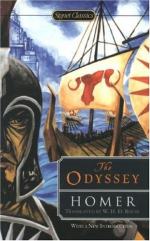’So I spake, and he was mightily angered at heart, and he brake off the peak of a great hill and threw it at us, and it fell in front of the dark-prowed ship. {*} And the sea heaved beneath the fall of the rock, and the backward flow of the wave bare the ship quickly to the dry land, with the wash from the deep sea, and drave it to the shore. Then I caught up a long pole in my hands, and thrust the ship from off the land, and roused my company, and with a motion of the head bade them dash in with their oars, that so we might escape our evil plight. So they bent to their oars and rowed on. But when we had now made twice the distance over the brine, I would fain have spoken to the Cyclops, but my company stayed me on every side with soft words, saying:
{* We have omitted line 483, as required by the sense. It is introduced here from line 540.}
’"Foolhardy that thou art, why wouldst thou rouse a wild man to wrath, who even now hath cast so mighty a throw towards the deep and brought our ship back to land, yea and we thought that we had perished {*} even there? If he had heard any of us utter sound or speech he would have crushed our heads and our ship timbers with a cast of a rugged stone, so mightily he hurls.”
{* Neither in this passage nor in B ii.171 nor in B xx.121 do we think that the aorist infinitive after a verb of saying can bear a future sense. The aorist infinitive after [Greek] (ii.280, vii.76) is hardly an argument in its favour; the infinitive there is in fact a noun in the genitive case.}
’So spake they, but they prevailed not on my lordly spirit, and I answered him again from out an angry heart:
’"Cyclops, if any one of mortal men shall ask thee of the unsightly blinding of thine eye, say that it was Odysseus that blinded it, the waster of cities, son of Laertes, whose dwelling is in Ithaca.”
’So I spake, and with a moan he answered me, saying:
’"Lo now, in very truth the ancient oracles have come upon me. There lived here a soothsayer, a noble man and a mighty, Telemus, son of Eurymus, who surpassed all men in soothsaying, and waxed old as a seer among the Cyclopes. He told me that all these things should come to pass in the aftertime, even that I should lose my eyesight at the hand of Odysseus. But I ever looked for some tall and goodly man to come hither, clad in great might, but behold now one that is a dwarf, a man of no worth and a weakling, hath blinded me of my eye after subduing me with wine. Nay come hither, Odysseus, that I may set by thee a stranger’s cheer, and speed thy parting hence, that so the Earth-shaker may vouchsafe it thee, for his son am I, and he avows him for my father. And he himself will heal me, if it be his will; and none other of the blessed gods or of mortal men.”
’Even so he spake, but I answered him, and said: “Would god that I were as sure to rob thee of soul and life, and send thee within the house of Hades, as I am that not even the Earth-shaker will heal thine eye!”




